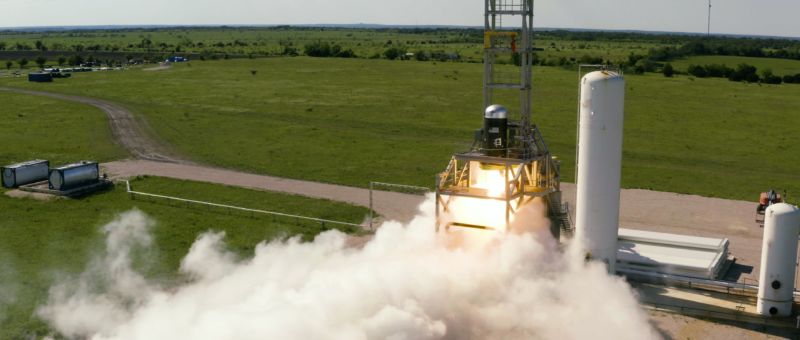https://arstechnica.com/?p=1523075

Edwards Media
One of the questions facing any company as it brings a new rocket to market is what to put on top of the booster. After all, things can sometimes go all explodey with inaugural flights. So the first flight of any rocket typically serves as demonstration missions, to prove via an actual test flight that all of a company’s modeling and ground testing were correct. SpaceX famously put Elon Musk’s cherry red Tesla Roadster on the first flight of the Falcon Heavy rocket.
Despite a sometimes whimsical payload, however, first flights demonstrate a number of capabilities to potential customers. (In the case of the Falcon Heavy, the rocket’s upper stage performed a six-hour coast in space before re-firing its upper stage engine to demonstrate the ability to directly inject key satellites into geostationary space for the U.S. military).
As the Austin, Texas-based rocket company Firefly nears the first flight of its Alpha rocket, the company also faces such a payload decision. It has an (undisclosed) customer for the flight, but the smallsat launcher also has some unused capacity for the mission—the Alpha rocket has about twice as much lift as an existing competitor, Rocket Lab’s Electron vehicle.
So on Monday, Firefly announced that it will accept some academic and educational payloads free of charge on the Alpha flight. “We’ve wanted to do something like this on our first flight from the beginning,” Markusic said. The payloads will fly to a 300km circular orbit, with a 97-degree inclination.
Space for all
The initiative is part of Firefly’s efforts to make space more affordable for everyone, said company founder Tom Markusic in an interview with Ars. As part of this DREAM program—that’s Dedicated Research and Education Accelerator Mission—the company will accept anything from a child’s drawing to college experiments, or even a startup company’s CubeSat. Applications will be accepted through the end of June, 2019.
By co-manifesting a commercial customer along with several other private payloads, Firefly will be able to demonstrate a capability to “rideshare” missions from the very beginning, Markusic said. This would allow multiple commercial customers to fly on missions in the future.
Markusic also provided an update on Alpha’s development. In April, the company performed a full-duration test of the rocket’s integrated second stage. A configuration of this second stage that is “97 percent flight-like” will be tested by the end of June. The company is also working toward full tests of the Reaver 1 engines that will power the Alpha rocket’s first stage, and integrated stage tests should begin by late August or early September.
He admitted that pushing toward a December launch from California’s Vandeberg Air Force Base is aggressive, and that to make it the company must meet a tight schedule of milestones. Objectively, a December launch is doable. Historically, however, Markusic said he realizes that problems often occur during stage testing and other activities that have the potential to delay launch dates.
via Ars Technica https://arstechnica.com
June 17, 2019 at 08:03AM
